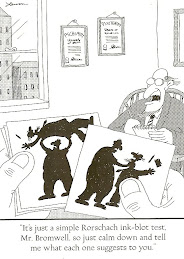While only a qualified mental health professional can diagnose bipolar disorder, it is by far the most over-diagnosed mental illness today (along with ADHD). This article will help you sort through some of the basics, to better prepare yourself for that talk with a psychiatrist or therapist, if you think you may be suffering from this disease.
The key is understanding mania. We all get depression, and we all understand that there are different levels of depression; most of us, thankfully, have never experienced true endogenous major depression. Mania, however, is widely misunderstood. The lay public and even many (if not most) mental health professionals mislabel various types of agitated moods as "manic episodes." There are different levels of mania as well, but even the simplest, lowest grade of mania--hypomania--is a step or two above and beyond any of the familiar forms of agitation all of us feel from time to time.
Do not confuse "mania" with other forms of emotional turmoil. Manic episodes can be characterized by elation, irritability or anxiety, for example, but they are not just euphoria, not simply aggravation. Mania is not even just extreme instances of these; mania is a sustained (usually weeks to months) state of psychomotor agitation, along with other neurovegetative signs (physical findings, like a decreased need for sleep, markedly increased libido and/or sped-up mental processes which manifest as super-fast thinking and pressured speech). In a nutshell, mania is like being on a stimulant drug, without the drug. There is sleeplessness and other forms of physical agitation, increased goal-directed activity, and increased risk-taking behavior. See below for disclaimers on each of these common, but commonly misunderstood, symptoms.
One major distinguishing characteristic is that manic episodes do not last minutes or hours, unless they are induced by stimulant drugs whose effects wear off. In that case, the diagnosis would be a substance-induced manic episode, which is not endogenous bipolar disorder. Bipolar disorder, or manic depression, occurs spontaneously, is often inherited, and usually starts fairly early in life (early adulthood or, less commonly, adolescence--rarely in childhood). It consists of alternating episodes of major depression (which usually comes first) and mania; untreated episodes of either of which last months, even years. Not minutes, or even hours! If you think you were "manic" last night (and you weren't high on drugs), but today you feel normal or even a little down, you were almost certainly not clinically manic last night. Whatever the agitation was, it was not due to bipolar disorder; untreated mania lasts 6-9 months, on average. Even "rapid-cycling" bipolar doesn't cycle from morning to night, no matter what even some health care providers might be saying.
Racing Thoughts. Patients report "racing thoughts" because enough mental healthcare providers have asked enough patients point-blank, "Do you have racing thoughts?" that the term has entered the popular vernacular. This is unfortunate, because what people usually mean when they spontaneously endorse "racing thoughts" is worries, even obsessive thinking. Not being able to shut the mind off at bedtime, for example. This is not what psychiatrists meant when they coined the term, referring to mania. For one thing, a manic individual doesn't need to sleep, doesn't want to sleep, doesn't lie in bed trying to turn the thoughts off; a manic individual runs with his or her thoughts and impulses (usually to his or her detriment). So those sleepless nights when you're tossing and turning and can't stop thinking about all your problems--common enough, but nothing to do with "racing thoughts."
It's a poor question to ask, clinically, "Do you ever have racing thoughts?" because the presence of racing thoughts will be evident to the examiner without having to ask: speech will be pressured, that is, rapid and difficult to interrupt, and may not make a lot of sense. The connections between individual thoughts are often loose, and it can really be impressive to hear.
Sure, sometimes individuals experiencing mania will have a subjective sense that their thoughts are racing. They might feel that they cannot speak fast enough to get the words out, that ideas are tumbling over themselves in their mind, but, alternately, a manic individual may be so sped up that s/he isn't aware that thinking and speech are abnormally rapid and over-inclusive.
If you are drowning in ideas and can't talk fast enough to get your point across and your mind is darting from one brilliant insight to the next, you may be having "racing thoughts," but at that point you have a formal thought disorder and the thoughts themselves are likely the least of your problems. Otherwise, thinking too hard and too much (almost always worried thinking) or obsessing or ruminating on a particular topic that's unwelcome to you and that you wish you could get out of your mind has nothing to do with mania.
Sleeplessness is another hallmark of mania, but again, it's not insomnia in the sense that you want to sleep but can't. When you experience mania, you don't feel the need for sleep, bedtime becomes an inconvenience and the fact that the rest of the hemisphere has called it a day is too bad for them! A manic person may know s/he is supposed to be sleeping and should be trying to, because everybody else is, but that person doesn't feel the need for sleep, or very much of it, at any rate, for days on end. Again, it's like being on speed, without having taken any drugs. Even as little as two or three hours a night is often more than enough sleep to satisfy the manic individual. Of course, as with the guy on drugs, a crash is inevitable. The difference is that, for the manic depressive, the crash might not come for many weeks or many months, by which point lots of havoc has been wrought in that person's life by ill-advised, impulsive behavior. It's not the wakefulness itself that's the problem, especially not to the person experiencing it, beyond the inconvenience of it; it's what the person does while not sleeping.
Impulsivity manifests as increased pleasure-seeking, and the risk-taking that goes along with that. As I've said, there are different levels of mania, so there are different levels of outrageous behavior that manic individuals accomplish, but the key is that the behaviors are way out of the norm: way, way, more heedless and hedonistic than is typical for the person at baseline, and for most of us that means pretty scandalous behavior. Things like extreme promiscuity, spending hundreds or thousands of dollars on things one doesn't need and can ill-afford, even criminal activity. Again like the gal on drugs, getting arrested is something that happens to acutely manic individuals all the time. Being high gets you in trouble, whatever the cause.
Spending sprees. We've all been on little spending sprees. The manic spree is beyond the pale. It's infused with overt grandiosity, a careless sense of "must-have" entitlement and it usually involves hundreds or even thousands of dollars spent on items of little or no practical value. In the middle of a manic episode, there is no hesitation or buyer's remorse, no guilty feeling that nags, "I shouldn't be spending so much," etc.
Instead, there's a sense of urgency that pervades everything during a manic episode: an acute need to spend, to acquire, to invest in material things. Often the spree is an expression of big plans to come, of a false sense of personal capability, even greatness. "I'm worth it."
Thoughts of, "Can I really afford this?" are entirely alien. Even if it's all being charged, the notion that the spender isn't clever and resourceful enough to raise the funds to pay for it all anyway is unthinkable. Manic individuals are often sure they are about to become very rich, and very famous, very soon, so why put off the purchases? Once on the spree, impulsivity takes over and truly bizarre items make the shopping cart, items that are often pretty or fancy or exotic, but items the utility of which is sometimes difficult to explain when things have calmed down. Have you ever asked yourself about a purchase, "What was I thinking?" If you have, it was probably limited to some article of clothing you later had second thoughts about. Multiply that feeling many times over and imagine asking yourself why you thought you needed an antique jewel-encrusted scimitar and you begin to imagine the types of purchases a truly manic spree can result in.
Most people have never experienced a manic spending spree, because most people are not bipolar.
Expansiveness. Ever feel like going up to a complete stranger and bonding, becoming best friends instantly, or better yet, proposing you run off together to find adventure? Probably not. Manic individuals take "outgoing" to new, sometimes dangerous, heights. Social barriers become non-existent, and reasonable interpersonal boundaries often get trampled. This can be very unsettling to the person accosted by the manic individual (provided that person is not hyper-expansive herself).
When expansiveness meets hyper-religiosity, the person finds a street corner and starts preaching to the world; literally any passer-by could be the next repository of the manic individuals' endless, newfound sense of cosmic understanding.
Hyper-spirituality. If there is a gold-standard manic symptom, this is it. A manic person can become suddenly in touch with God (as s/he understands God). This is not merely a religious epiphany; it's paranoia in its grandiose form (not all paranoia is persecutory). When mania is strong enough, it is not at all uncommon for the person to feel a special connection with God, even to hold himself or herself forward as a prophet. History is replete with examples of individuals for whom this experience became an actual self-fulfilling prophecy (no pun intended): billions and billions of followers have been engendered by the greatness that pure spirituality endows.
These are some of the highlights of actual mania, albeit moderate-to-severe; several of the examples above qualify for mania with psychosis, that is, losing touch with reality, although most manic episodes do not result in psychosis. Of course there are milder, subtler forms, which is why so many practitioners confuse lesser forms of agitation for hypomania and diagnose "bipolar type II," which consists of major depression and minor episodes of mania. But true mania is still true mania, no matter how mild, and the fact remains that most of these "hypomanic" diagnoses are just plain wrong. Anxiety and irritability and sleeplessness and impulsivity, even when pronounced and protracted, are usually not signs of an actual manic episode. Actual mania is much rarer than garden-variety agitation.
The distinction between actual mania and other forms of agitation is a critical one, because the mood stabilizers used to treat mania can be quite toxic, much more so than the standard antidepressants that are on the market. The latter are safe and well-tolerated and even help those episodes of agitation that are mistakenly labeled as "manic episodes," whereas mood stabilizers per se (such as lithium and Depakote) are heavy-duty medications with heavy-duty side effects and should not be used carelessly.
Not only that, but if you are mistakenly diagnosed as bipolar a prescribing doctor may hold back on so-called mood elevators (like Prozac) because s/he thinks that they will make your "mania" worse, when your "mania" is actually extreme irritability and anxiety that's causing mood swings and what you need most is a medication like Prozac! Prozac and Zoloft and Celexa and other SSRIs will stabilize most (non-bipolar) moods, and are often underutilized in individuals because of a false bipolar label. Even in actual patients with bipolar disorder, these medications can be extremely beneficial, when properly paired with an antimanic agent.
Once a person has been diagnosed with bipolar disorder, the diagnosis tends to stick, regardless of its accuracy, as the individual goes from one mental healthcare provider to the next, because often the diagnosis is simply accepted by the new practitioner, who fails to take a comprehensive history and perform adequate serial mental status examinations himself or herself, to verify the diagnosis over time. I have treated literally scores of individuals who had been treated for years by numerous physicians for "bipolar disorder" who turned out not to be bipolar, so be skeptical, ask questions and make your treating physician prove to you why your symptoms are those of actual manic depression and how s/he ruled out other, more common syndromes like unipolar depression, adjustment disorders, substance abuse and personality disorders.
No one is equipped to diagnose himself or herself; see a qualified mental health professional, but it never hurts to research what you are being told. Good luck.
Read this: An Unquiet Mind


